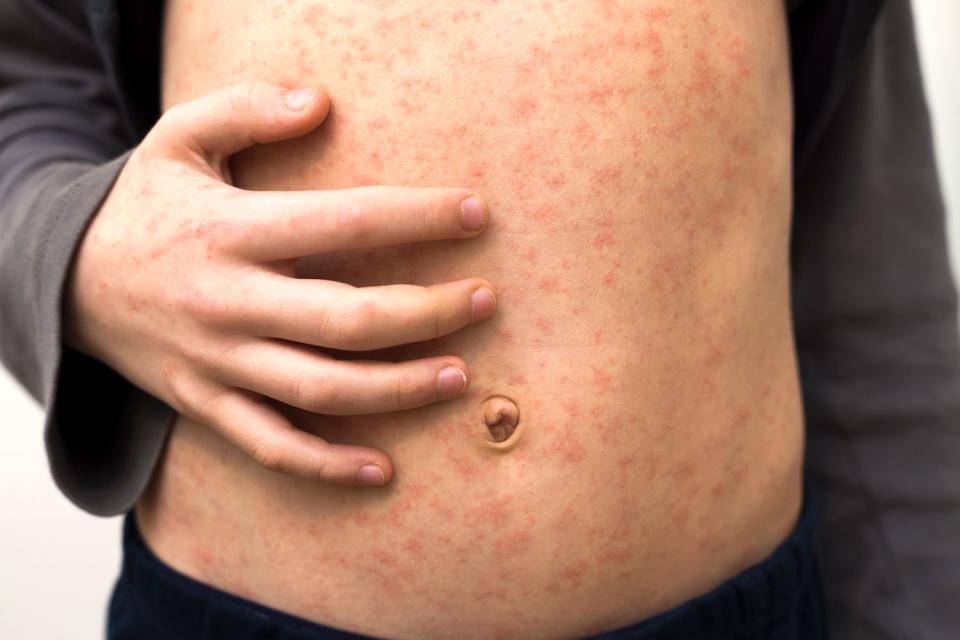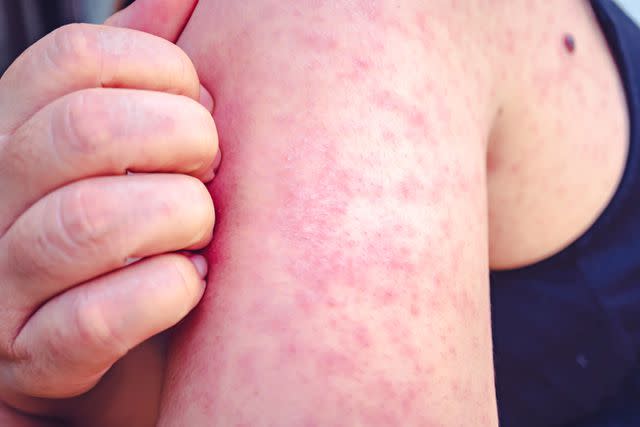Rise in 'Extraordinarily Contagious' Measles Cases in the U.S.: 'It's Back' and 'Much More Serious Than the Chickenpox'
A sharp rise in cases since the start of 2024 could mean that the U.S. loses its measles elimination status

Getty
Measles rash.For more than two decades, the U.S. has considered measles to be “eliminated” — a status it has maintained in spite of a few isolated outbreaks.
However, a sharp rise in cases in the first three months of 2024 means that the U.S. may no longer be able to consider measles eliminated, the Center for Disease Control said Thursday.
"To be honest, I think we have lost our elimination status already," Dr. Bruce Farber, Chief of Public Health and Epidemiology for Northwell Health, told PEOPLE. "How can you say we're measles-free when we're seeing measles?"
Symptoms include a high fever, cough, runny nose and watery eyes — but the most notable symptom is the red rash, which often covers the entire body. Complications include pneumonia and encephalitis, which is when the brain swells.
"Measles is much more serious than the chickenpox," Farber tells PEOPLE. "A significant number will have a complication requiring hospitalization."

Getty
Measles on the arm.Since the beginning of 2020, the U.S. has recorded a total of 338 cases — but 29% of those cases have been reported since this year alone.
As the CDC says, “The rapid increase in the number of reported measles cases during the first quarter of 2024 represents a renewed threat to elimination.”
The cases were reported “almost all in persons who were unvaccinated or whose vaccination status was unknown. As of the end of 2023, U.S. measles elimination status was maintained.”
The CDC noted that nearly in all the cases, those infected by measles had either traveled internationally, or spent time with someone who had.
In March, the Cincinnati Health Department warned that there was a potential for a measles exposure at a Disney on Ice performance.
Earlier, officials in Virginia flagged two airports — Dulles International Airport or Ronald Reagan Washington National Airport — as being the sites of potential measles exposures.
And in Philadelphia, there was a confirmed outbreak of measles, where one child may have been the source of infection for at least seven people at a daycare center and hospital.
Part of the issue, the CDC explains, is that measles is airborne.
Never miss a story — sign up for PEOPLE's free daily newsletter to stay up-to-date on the best of what PEOPLE has to offer, from celebrity news to compelling human interest stories.
“The virus is transmitted by direct contact with infectious droplets or by airborne spread when an infected person breathes, coughs, or sneezes,” the CDC says.
"If you take one person with measles. and you put them in a room with 10 others, and if they're not immune, then nine out of those 10 will get measles just from airborne spread," Farber tells PEOPLE. "It's extraordinarily contagious."
You don’t need to be in the same room as an infectious person either, as the CDC notes, “measles virus can remain infectious in the air for up to two hours after an infected person leaves an area.”

Getty
A child gets a vaccine.Related: Florida Surgeon General Appointed by Ron DeSantis Goes Against Science amid Florida Measles Outbreak
Measles is one of the vaccines included in the MMR shot, commonly given to children in the U.S. as part of their routine childhood vaccination schedule. It’s a two-dose shot, with the first being administered as early as 12 months, and a second dose administered at age four.
"There's no comparison to a cold. It's, it's nothing like a cold," Farber tells PEOPLE.
The agency ended its alert encouraging everyone to get vaccinated, adding that while the risk of transmission is low because of high population immunity, vaccination coverage remains below the amount “necessary to prevent sustained measles transmission.”
As for those who are hesitant to get the vaccine or give it to their child, Farber said, "there's no evidence, at all, that this MMR causes autism or any other serious problems. And measles does."
He continued: "It's very sad to see preventable diseases. We eliminated measles, from a practical basis, in the year 2000 and now it's back."
For more People news, make sure to sign up for our newsletter!
Read the original article on People.

